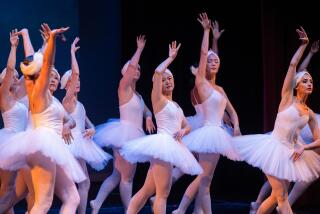AN APPRECIATION : Nureyev . . . Thoughts on Death of a Superstar
- Share via
George Balanchine insisted that ballet was woman. He didn’t reckon, of course, with Rudolf Nureyev, who died in Paris Wednesday.
*
Until the Kirov defector made his dramatic leap to superstardom in the West, 31 years ago, most of the world regarded ballet primarily as the realm of dainty sprite in a white tutu. The danseur was a deferential partner whose essential duty was to lend princely support.
There had been great male dancers, to be sure, from the fabled Nijinsky to the elegant Erik Bruhn. But none of them managed to redefine the art they served.
For better or worse--probably both--Nureyev respected no definitions. He didn’t have to.
He was the right person with the right resources in the right place at the right time. He had everything--a lithe, muscular body, a dazzling technique, an exceedingly healthy ego and, probably most crucial, a brooding, magnetic, yes, charismatic personality.
He could move with lightning speed and fly with brazen velocity, exuding what his blissful press agents liked to call animal magnetism all the while. He delighted exacting balletomanes, and, at the same time, he excited a massive segment of the public that couldn’t tell a toe shoe from a horse shoe.
His flamboyant personality helped keep him in the public eye. His penchant for controversy magnified his audience appeal.
When Nureyev was on the stage, especially in the early years, he tended to obliterate nearly everyone else. He could be erratic. He could be callous. He was not averse to distorting a sequence, a role, or even a ballet, if doing so made him look a bit more heroic or a bit more glamorous. Self-discipline was not his forte, even in his best days.
In his best days, however, it didn’t matter much. His fabled partnership with Margot Fonteyn, the epitome of Royal British decorum and a ballerina 20 years his senior, brought out the best in both dancers. She managed to cool his raging inner fire. He ignited hers.
Nureyev’s emergence into the international limelight had its impact on virtually every male dancer--rival, emulator or follower. Nureyev seemed to give everyone the authority to take liberties with style and tradition. In his wake, the men began to jump a little higher, spin a little faster, assert themselves a bit more aggressively.
He became a hero among heroes, a sport among sportsmen and a poet among poets. Inadvertently, he paved the way for another dashing Soviet defector who eventually stole--well, inherited--his thunder: Mikhail Baryshnikov.
Critics complained--more with each passing year--that Nureyev could be mannered and self-indulgent literally to a fault. They noted, with increasing disappointment, that he wasn’t always as versatile as he wanted to be. Whatever the guise, Nureyev was Nureyev. Purists lamented the disruptive effect he had on ensemble values. He must have wept all the way to the bank.
He knew what he wanted to do: everything. He had only one serious enemy: time.
Time is especially cruel to ballet dancers. Their careers, by definition, are short. Nureyev tried to ignore the calendar. He kept on performing, and adjusting, the triumphant challenges of his youth long after the spirit was more willing than the body. His defiance was poignant, and it was pathetic.
Even in his prime, he danced too often. He also may have danced too broad a repertory for his own good.
He obviously wanted to prove that he was above type-casting, that the Kirov prince could also be a modernist. Often he succeeded admirably. Sometimes he failed honorably. Occasionally he just failed.
At his lofty best, he was a serious, probing, memorable artist. At his willful worst, he could be infuriatingly narcissistic. Even at his worst, however, he all but dared the viewer not to watch him and, by inference, not to love him.
When his career in ballet threatened to wane, he ventured some extraordinary diversionary tactics. He made a couple of movies, including a ludicrous biography of an earlier superstar-Rudolf named Valentino, but success remained elusive. He played Rodgers and Hammerstein’s King of Siam, but could not exorcise the ghost of Yul Brynner. He attempted some character roles, but Franz was not comfortable impersonating Dr. Coppelius.
He tried running the Paris Opera Ballet, but could not conquer a Gallic system that confuses arts administration with politics. He even tried his hand at conducting, but hardly persuaded anyone that his excursion from stage to pit was more than a gimmick.
He did achieve measured acclaim as a choreographic arranger, and his final public challenge was a new staging of “La Bayadere” in Paris last October. Gaunt and frail, he accepted his post-premiere tributes from a chair.
It was a shock to see him muted by a horrible illness. He looked confused, frightened and sad. Worst of all, perhaps, he looked old. At 54, Rudolf Nureyev had lost his battle with time.
More to Read
The biggest entertainment stories
Get our big stories about Hollywood, film, television, music, arts, culture and more right in your inbox as soon as they publish.
You may occasionally receive promotional content from the Los Angeles Times.










